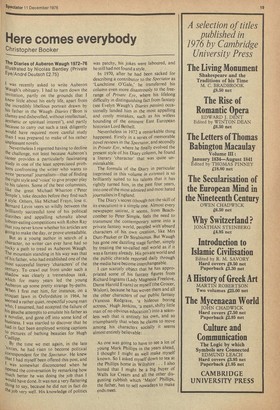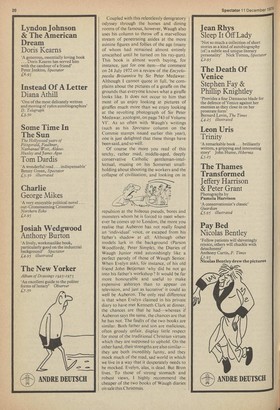Here comes everybody
Christopher Booker
The Diaries of Auberon Waugh 1972-76
Illustrated by Nicolas Bentley (Private Eye/Andre Deutsch £2.75)
I was recently asked to write Auberon Waugh's obituary. 1 had to turn down the Invitation, partly on the grounds that I knew little about his early life, apart from the incredibly libellous portrait drawn by his father in the Waugh Diaries ('Bron is clumsy and dishevelled, without intellectual, aesthetic or spiritual interest'), and partly because to carry out such a task diligently would have required more careful study than I was prepared to make of his rather unpleasant novels.
Nevertheless I regretted having to decline the challenge, not least because Auberon's career provides a particularly fascinating study in one of the least appreciated problems confronting the writer who wants to write 'personal' journalism—that of finding the right style and 'voice' to give proper play to his talents. Some of the best columnists, like the great Michael Wharton (Peter Simple), take decades before they find such a style. Others, like Michael Frayn, lose it. Bernard Levin veers so wildly between the brilliantly successful tone of his political diatribes and appalling schmaltz about lobster-eating competitions with Robin Ray that you never know whether his articles are going to make the day, or prove unreadable.
But as a young author in search of a Character, no writer can ever have had so rocky a path to tread as Auberon Waugh. The mountain standing in his way was that of his father, who had established one of the Most successful literary 'characters' of the century. To crawl out from under such a Shadow was clearly a tremendous task, Which for many years led the young Auberon up some pretty strange by-paths. When I first met him, for instance, on a croquet lawn in Oxfordshire in 1964, he seemed a rather quiet, respectful young man W.110, I assumed, had accepted the failure of his gauche attempts to emulate his father as a novelist, and gone off into some kind of business. I was startled to discover that he had in fact been employed writing captions tc pictures of bathing beauties for Hugh Cudlipp.
, By the time we met again, in the late sixties, he had risen to become political correspondent for the Spectator. He knew that I had myself been offered this post, and I was somewhat disconcerted when he opened the conversation by remarking how Much better he was doing the job than 1 Would have done. It was not a very flattering thing to say, because he did not in fact do tne job very well. His knowledge of politics
was patchy, his jokes were laboured, and he still had not found a style.
In 1970, after he had been sacked for describing a contributor to the Spectator as 'Lunchtime O'Gale,' he transferred his column even more disastrously to the freerange of Private Eye, where his lifelong difficulty in distinguishing fact from fantasy (see Evelyn Waugh's Diaries passim) occasionally landed him in the most appalling and costly mistakes, such as his witless hounding of the eminent East European historian Lord Bethel!.
Nevertheless in 1972 a remarkable thing happened. Firstly in a series of memorable novel reviews in the Spectator, and secondly in Private Eye, where he finally evolved the present style of his Diary column, he found a literary 'character' that was quite unmistakable.
The formula of the Diary in particular (reprinted in this volume in extenso) is so brilliantly suited to his talents that it has rightly turned him, in the past four years, into one of the most admired and most hated journalists in England.
The Diary's secret (though not the skill of its execution) is a simple one. Almost every newspaper satirist, it seems, from Beachcomber to Peter Simple, feels the need to transmute the contemporary scene into a private fantasy world, peopled with'absurd characters of his own creation, like Mrs Dutt-Pauker or Dr Strabismus. But Waugh has gone one dazzling stage further, simply by treating the so-called real world as if it was a fantasy already. His private world and the public charade reported daily through the media have become interchangeable.
I can scarcely object that he has appropriated some of his fantasy figures from Richard lngrams (Lady Magnesia Freelove, Dame Harold Evans) or myself (the Grocer, Wislon), because he has woven them and all the other characters of our public fantasy (Vanessa Redgrave, 'a hideous boring actress,' Hugh Jenkins, 'a mean, shifty little man of no obvious education') into a seamless web that is entirely his own, and so triumphantly that when he claims to move among his characteis socially it seems almost entirely believable : As one was going to have to see a lot of young Mark Phillips in the years ahead, I thought I might as well make myself known. So I asked myself down to tea at the Phillips home in Wiltshire . . . I also hinted that I might be a big buyer of Walls Ice Cream and all the other disgusting rubbish which 'Major' Phillips, the father, has to sell nowadays to make ends meet.
Coupled with this relentlessly denigratory odyssey through the homes and dining rooms of the famous, however, Waugh also uses his column to throw off a marvellous stream of penetrating asides at the more asinine figures and follies of the age (many of whom had remained almost entirely unscathed until he turned on his ray-gun). This book is almost worth buying, for instance, just for one item—the comment on 24 July 1972 on a review of the Encyclopaedia Britannica by Sir Peter Medawar. Although I cannot quote in full, 'he complains about the pictures of a giraffe on the grounds that everyone knows what a giraffe looks like. It does not occur to him that most of us enjoy looking at pictures of giraffes much more than we enjoy looking at the revolting photograph of Sir Peter Medawar, zoologist, on page 743 of Volume VI'. As so often with Waugh's writings (such as his Spectator column on the Commie stamps issued earlier this year), one is just delighted that these things have been said, and so well.
Of course the more you read of this tetchy, rather mad, middle-aged, deeply conservative Catholic gentleman-intellectual, musing on his Somerset smallholding about shooting the workers and the collapse of civilisation, and looking on in repulsion at the hideous pseuds, bores and monsters whom he is forced to meet whenever he conies up to London, the more you realise that Auberon has not really found an 'individual' voice, or escaped from his father's shadow at all. Although other models lurk in the background (Parson Woodforde, Peter Simple), the Diaries of Waugh Junior read astonishingly like a perfect parody of those of Waugh Senior. When Evelyn asks, for instance, of his old friend John Betjeman 'why did he not go into his father's workshop? It would be far more honourable and useful to make expensive ashtrays than to appear on television, and just as lucrative' it could as well be Auberon. The only real difference is that when Evelyn claimed in his private diary to have met Kenneth Clark at dinner, the chances are that he had—whereas if Auberon says the same, the chances are that he has not. The faults of the two books are similar. Both father and son are malicious, often grossly unfair, display little respect for most of the traditional Christian virtues which they are supposed to uphold. On the other hand, their strengths are also similar— they are both incredibly funny, and they mock much of the mad, sad world in which we live in a way that it desperately needs to be mocked. Evelyn, alas, is dead. But Bron lives. To those of strong stomach and robust views, I highly recommend the cheaper of the two books of Waugh diaries on sale this Christmas.



































 Previous page
Previous page